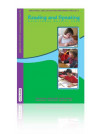In 2008, the second year of the fourth cycle of national monitoring, three areas were assessed: music, aspects of technology, and reading and speaking. This report presents details and results of the assessments of reading and speaking.
Frameworks for reading and speaking assessment are presented in Chapter 2. These frameworks highlight the importance of constructing and communicating meaning for a variety of purposes, and indicate how particular understandings, insights, skills, processes and motivational factors contribute to effectiveness in reading and speaking.
Most students responded with considerable enthusiasm to tasks involving hands-on experimentation, as individuals or as teams. Their enthusiasm for tasks exploring knowledge and understanding of scientific phenomena and concepts was lower on average, but varied considerably depending on the particular task.
New Zealand’s National Education Monitoring Project commenced in 1993, with the task of assessing and reporting on the achievement of New Zealand primary school children in all areas of the school curriculum. Children are assessed at two class levels: year 4 (halfway through primary education) and year 8 (at the end of primary education). Different curriculum areas and skills are assessed each year, over a four-year cycle. The main goal of national monitoring is to provide detailed information about what children know, think and can do, so that patterns of performance can be recognised, successes celebrated, and desirable changes to educational practices and resources identified and implemented.
Each year, random samples of children are selected nationally, then assessed in their own schools by teachers specially seconded and trained for this work. Task instructions are given orally by teachers, through video presentations, on laptop computers, or in writing. Many of the assessment tasks involve the children in the use of equipment and materials. Their responses are presented orally, by demonstration, in writing, in computer files, or through other physical products. Many of the responses are recorded on videotape for subsequent analysis.
Key Results
Both year 4 and year 8 students showed greater skill in reading words accurately (decoding) than in interpreting and acting on the messages they were reading (comprehension). Performance was quite weak in scanning for information. Year 8 students, on average, performed at a substantially higher level than year 4 students, but there was a quite large overlap in performance. Performance differences between year 4 and year 8 students were generally smaller on speaking than reading tasks.
Performance in reading did not improve or decline between 2004 and 2008, but trends since 1996 show a quite substantial improvement overall for year 4 students and a small improvement for year 8 students. In both cases the improvement occurred mainly between 1996 and 2000, with little change since then.
Performance in speaking did not improve or decline between 2004 and 2008. Over the 12 years since 1996, the accumulated evidence suggests a small improvement for year 4 students and a small decline for year 8 students.
The relative popularity of reading and speaking compared to other school subjects has not changed over the past 12 years, but reading has become a less popular activity outside of school, especially for year 8 students. Reading books (both fiction and non-fiction) has declined markedly in popularity compared to reading magazines and comics.
Girls in both year 4 and year 8 typically performed a little better than boys on both reading and speaking tasks, but with a huge overlap in performance. On average, Pakeha students scored moderately higher than Māori students in both reading and speaking, but the performance gap in reading has narrowed a little over the last eight years. At year 4 level, Pasifika students scored moderately lower than Pakeha students in both reading and speaking, a disparity which has decreased a little over the past eight years, but the corresponding differences for year 8 students are quite large and not decreasing.

